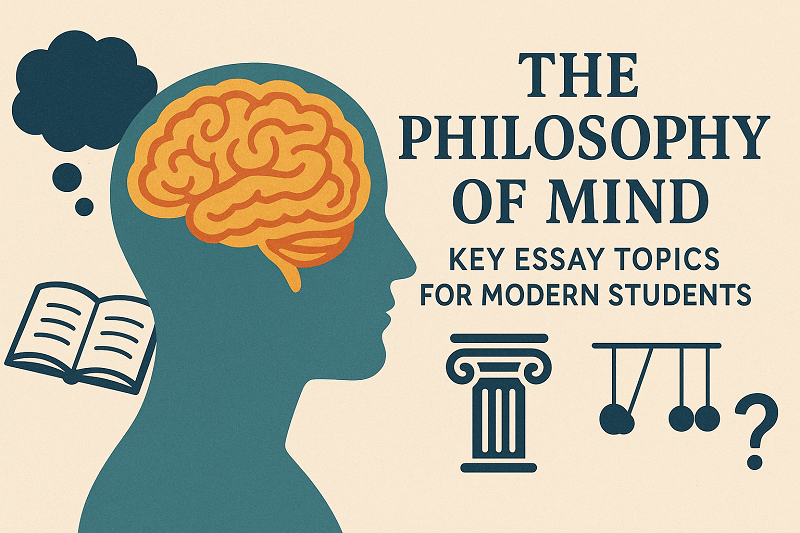The philosophy of mind has long been one of the most fascinating branches of philosophy, inviting deep reflection on consciousness, thought, and human identity. For modern students, exploring this field provides not only intellectual stimulation but also valuable insights into contemporary debates in science, psychology, and technology. Writing about the mind can be challenging, but it also offers some of the most rewarding opportunities for academic growth. To approach this field effectively, students need a strong understanding of potential essay directions, examples of successful writing, and the central themes that continue to dominate discussions in this discipline.
Why the Philosophy of Mind Matters
The philosophy of mind addresses key issues such as the nature of consciousness, the relationship between mental states and the physical brain, and whether artificial intelligence will ever become a genuine thinker. These questions are not just abstract, they relate to burning contemporary issues, both medical ethics in neurology and the question of machine learning and automation. To a student who is required to write in this subject, a good list of topics of philosophy essay would be the entry point to a narrower discussion. An essay on the mind-body problem, which is one of the most persistent puzzles in philosophy, could be a result of a question on the relations between brain activity and the subjective experience. Many students seek a reliable philosophy paper writing service to handle complex topics and ensure their essays meet academic standards.
Core Areas of Debate
Among the most effective methods of coming up with effective essay topics for philosophy students is by coming up with the fundamental areas of discussion in the philosophy of mind. Mind-body problem is also the core of the sphere, and dualism, physical-ism, and emergent-ism raise numerous questions to study in more detail. Students are also able to pay attention to the essence of consciousness itself, whether it is possible to explain subjective experience in full and by some scientific means.
Personal identity is another fruitful area. How is it possible to be the same person across the time? When our recollections and experience have made us who we are, how is our losing them change us? Researching in this direction can make one write insightful pieces that are a combination of philosophy, psychology, and cognitive science. Students in these fields can get some motivation by reading the best philosophy essay examples, in which authors have managed to answer these challenging questions by combining theory, analysis, and implications in practice.
These debates have more layers due to modern concerns. As the field of artificial intelligence continues to evolve at a rapid pace, a large number of students are drawn to questions such as whether machines can think, whether they can be morally accountable, and whether they could possess consciousness. These are the new issues that provide students with an opportunity to write outstanding essays, particularly when they relate classical theories to current dilemmas. Law assignment helper can provide students with structured guidance and support when managing multiple essays and tight deadlines.
Learning by Successful Examples
When students are confused about complicated content one of the most effective measures to take is to go through the best philosopher essay examples. Through these models, one can clearly frame a question, have a thesis, and evidence to the point. A good example would demonstrate how to step-by-step reduce a complex controversy like the question of whether consciousness can be reduced to brain processes to manageable steps. Another illustration may show how to critically address the contrary opinions and evidence the significance of impartiality and equilibrium in philosophical writing.
In students who are yet to find their path, it is always valuable to read extensively in philosophy essay topics. Through analysis of examples, they are able to understand how other people dealt with questions like free will, intentionality or mental causation. Another difference in the writing styles can be discussed in these essays: some authors use a highly critical format, and others incorporate a narrative or case studies. Through these approaches, students are able to recognize approaches that can be adopted and used according to their strengths.
One should bear in mind though that examples are guides and not templates. Each of students has a different view. The best writing usually appears when the students take the essay topics for philosophy students as stepping stones and then develop it to individual questions, relating the abstract theory with the real-life problems of the modern era. Such an amalgamation of individual interest and academic discipline results in original and provocative essays.
Creating Effective Essay Questions
Choosing the appropriate topic is just as important as the actual writing. Vague, repetitive, or irrelevant to real debates are some of the outcomes that may occur due to poorly selected subjects. The questions should be clear, yet at the same time open ended to provide room to explore. An example will be what is consciousness? is too general, perhaps, yet Can physical-ism explain all about consciousness? gives emphasis and yet allows room to argue.
Philosophy students are usually given a chance to select their essay topics in university assignments and are likely to be overwhelmed by the task. The reduction of the possibilities presupposes the consideration of personal interest and possibilities. An ethics of brain simulation would be chosen by a student who is interested in neuroscience, and the theories of free will could be chosen by a student interested in metaphysics. The best philosophy essay examples are also likely to be thought-provoking, as most of them demonstrate how some general concept was narrowed down to a point of research-ability and usefulness.
After selecting a question, it is important that one pre-writes arguments and counterarguments to the question. A good essay recognizes the counterarguments and justifies the thesis presented in the essay. This equilibrium is mature thought and it is in keeping with the demands of philosophical scholarship. As with the mind-body problem or artificial intelligence, or theories of personal identity, clarity and focus are the success factors.
Conclusion
The philosophy of mind offers some of the most stimulating challenges for today’s students. By exploring key debates about consciousness, identity, and artificial intelligence, writers can engage with both timeless questions and urgent contemporary issues. To succeed, students must begin with well-chosen philosophy essay topics, develop them with structure and precision, and learn from the best philosophy essay examples available.
Above all, writing in this field demands a balance of comprehension and creativity. Students must understand the history of thought while adding their own insights. By doing so, they not only meet academic expectations but also cultivate the skills of critical thinking, clear reasoning, and thoughtful communication. For anyone searching for meaningful essay topics for philosophy students, the philosophy of mind provides a fertile ground where curiosity and intellect meet. When approached with dedication, essays in this field become more than assignments — they become opportunities to explore what it truly means to be human.





